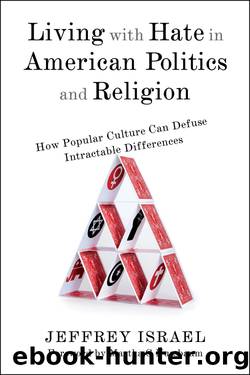Living with Hate in American Politics and Religion by Jeffrey Israel

Author:Jeffrey Israel [Israel, Jeffrey]
Language: eng
Format: epub
MITIGATING THE MISSING LINK PROBLEM
This brings me, finally, to the missing link problem: the fact that we will inevitably be tempted by the thought that we can somehow eventually cross a threshold into a society unmarred by perversity. The problem, we may recall, is that our incorrigible desire for the âperfect justiceâ of angels will always inevitably clash with our interminable status as products of historical injustice. We can now imagine a vision in which utopian longings for wholeness are redirected toward the domain of play and away from the domain of the political, where we must settle for merely political justice instead of âperfect justice.â Remember, this is not a purgation theory. The idea is not that we must purge the frustration produced by merely political justice or that the domain of play is the receptacle where the purged material is contained. Instead, the idea is that flourishing is bifurcated through cognitive and social processes of framing: what is exercised in the domain of play is not âwasteâ; it is constitutive of a thriving life for the person playing. It is differentiated not by its level of importance, but by the frame that distinguishes it from the instrumental domains of the political and the background culture.
In fact, the play with wholeness, totality, purity, and transgressive action that happens in the domain of play will often feel more important to an individual in everyday life than does his political participation. Playing has a personalized quality and is more immediate. Given the political conception of the person that I advocate, I obviously assume that every member of society will consider it a great and gratifying good to thrive together in a common political life. But thriving in the domain of the political can never be entirely satisfying.
However much human beings long for a common life together, characterized by justice, they will also yearn to feel their grudges and aversions without inhibition, and to exercise their tendencies to domination, disgust, revenge, aggrandizement, and ressentiment. Thus thriving in political life will not be quite as gratifyingâor gratifying in the same wayâas thriving in the games, fantasies, joking, and aesthetic experiences that we enter in the domain of play. After all, the primordially important stuff of childhood is often implicated in play, and this gives playing very great importance indeed. Far from feeling frivolous or trivial, playing can be utterly immersive, and a person can reach the heights of intense human experience while playing.29 It is precisely because play thriving can be as immersive and intense as political thriving, if not more so, that the missing link problem can be âabsorbedâ into the domain of play.
In the context of the missing link problem, it is worth mentioning a feature of play that I did not include in my formal definition. Huizinga thought that play tends to produce âplay-communitiesâ that maintain the tradition of play when the play has ended.30 He wrote, âthe feeling of being âapart togetherâ in an exceptional situation, of sharing something
Download
This site does not store any files on its server. We only index and link to content provided by other sites. Please contact the content providers to delete copyright contents if any and email us, we'll remove relevant links or contents immediately.
Getting It, Then Getting Along by L. Reynolds Andiric(652)
Religion and Politics Beyond the Culture Wars : New Directions in a Divided America by Darren Dochuk(575)
Global Justice, Christology and Christian Ethics by Lisa Sowle Cahill(428)
Positive Psychology in Christian Perspective: Foundations, Concepts, and Applications by Charles Hackney(353)
Forgiveness and Christian Ethics by Unknown(347)
Douglas Hamp The First Six Days by Unknown(296)
The Horrors and Absurdities of Religion by Arthur Schopenhauer(271)
Insurgency, Counter-insurgency and Policing in Centre-West Mexico, 1926-1929 by Mark Lawrence(266)
Middle Eastern Minorities: The Impact of the Arab Spring by Ibrahim Zabad(249)
Christian Martyrdom and Christian Violence by Matthew D. Lundberg;(242)
The Oxford Handbook of Greek and Roman Mythography by R. Scott Smith;Stephen M. Trzaskoma;(235)
Beyond Heaven and Earth by Gabriel Levy(232)
God and Eros by Patterson Colin;Sweeney Conor;(230)
The Bloomsbury Reader in Christian-Muslim Relations, 600-1500 by David Thomas;(223)
Autobiography, Volume 2: 1937-1960, Exile's Odyssey by Mircea Eliade(215)
Witches: the history of a persecution by Nigel Cawthorne(211)
Cult Trip by Anke Richter(209)
An Introduction to Kierkegaard by Peter Vardy(198)
The Global Repositioning of Japanese Religions by Ugo Dessi(195)
